Dr. Williams advocates for corrected Hawaiian historiography
Photo by Aaron Veincent
Dr. Ronald Williams Jr. presents the issue of Hawaiian history being told by non-Hawaiians. The one hour speech covered many individuals who stood up for their lāhui, as well as individuals who put down the lāhui.
The University of Hawaiʻi’s Dr. Ronald Willams Jr. spoke about inaccurate portrayals of Hawaiian history being told from a foreign point of view as part of the Huliau Film and Lecture Series, which welcomed members from the community to Keʻeaumokupāpaʻiaheahe, Thursday, Feb. 23.
Dr. Williams is not a Native Hawaiian; however, he found a love for the culture through his respect for it, saying that it was his kuleana that drew him to study.
“I felt this urge to learn something. So I started to learn the language and little things like that,” he said.
Williams started by studying the language under Akoni Akana, a Hawaiian kumu and cultural icon.
“He started teaching me mele, Ke Kanikau, and all different types of things.”
Williams continued to study under other Hawaiian kumu, including KS Mauiʻs Nā Kumu Lōkahi and Kapulani Antonio. Eventually, he earned his Ph.D. in Hawaiian history from the University of Hawaiʻi at Mānoa.
Williams said that the Hawaiian history most people believe, beginning in the late 1800’s, is based upon primary sources written and told by non-native individuals. These individuals, motivated by business and political interests, spread false and misleading information that paved the way for annexation by the United States of America.
“I learned that a lot of people tried to silence the Hawaiian people and show them that they were less of what they were,” junior Hunter Worth said.
Williams pointed out several individuals who he said committed these acts. They included William Dewitt Alexander and Rev. Sereno Edwards Bishop. Two highly influential Americans who altered the historiography of Hawaiʻi in their tellings of the history and their reporting on current events.
Dr. Williams included many individuals in his slideshow who were kanaka who stood up for their lāhui, which they saw being threatened by the spread of misinformation and slander against Queen Liliʻuokalani.
He followed these individuals’ stories during the transition, a time from 1890-1899, when Queen Liliʻuokalani was about to be overthrown.
During this time, America was able to slowly take over Hawaiʻi’s land, as well as people’s rights and royal and democratic authority. Doing so led to the illegal annexation of Hawaiʻi to the United States.
One major factor of this process included publicizing the Hawaiian community as corrupt and horrible. Reverend Bishop had a big role in this. Writing more than 107 syndicated United Press articles under the pen name “Kamehameha,” his stories were picked up by thousands of newspapers across America.
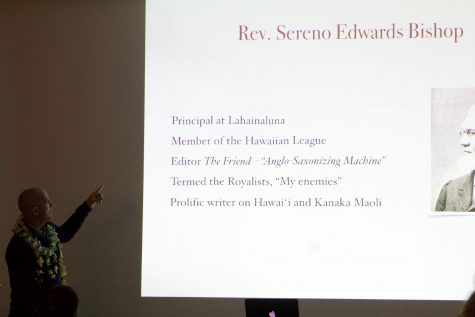
Ronald Williams Jr. explains who reverend Bishop is.
This was only one way an American bent the truth about Hawaiians, Williams said. Many more distorted the history for the eyes of foreigners.
“In actuality, Hawaiian people and all of its citizens were industrious and hard working,” Hunter Worth said.
Dr. Williamsʻ speech did not only include individuals who brought ruin to the Hawaiian social and political system, but people who preserved it as well but who did not get much recognition. He identified them as little-known Hawaiian patriots. One of these individuals was a former Maui sheriff, the Hon. William Pūnohuʻaweoweoʻulaokalani White. He was one of the last two men awarded the order of Knight Commander of Kalākaua by Queen Liliʻuokalani herself before she was deposed.
Despite being an influential person who went to prison for being a royalist, he is buried in a grave nearly lost to weeds.
The moʻopuna of White met with and agreed with Dr. Williams that it was time to install a proper grave marker, and last month, Dr. Williams launched a GoFundMe campaign to raise the money to do it. The account met the goal quickly, and on August 6, Whiteʻs birthday, there will be a day of education to tell about the life and importance of White to Native Hawaiian history and an unveiling of the marker.
To see the now-closed campaign and learn more about White, click here.
“Some of my friends donated money to the GoFundMe [campaign] not knowing or realizing how much this person did for the lāhui,” Kumu Kēhau Lucas said. Kumu Kēhau was one of about fifty people in attendance. The event was free and open to the public Thursday night.
Williams finished by encouraging the Hawaiian community to be more knowledgeable about their history, learn from a Hawaiian source rather than an American one, and take action knowing the correct history. “ʻEha to action,” he said, referring to channeling pain into constructive action.
For more information regarding Williams’ work, click here.

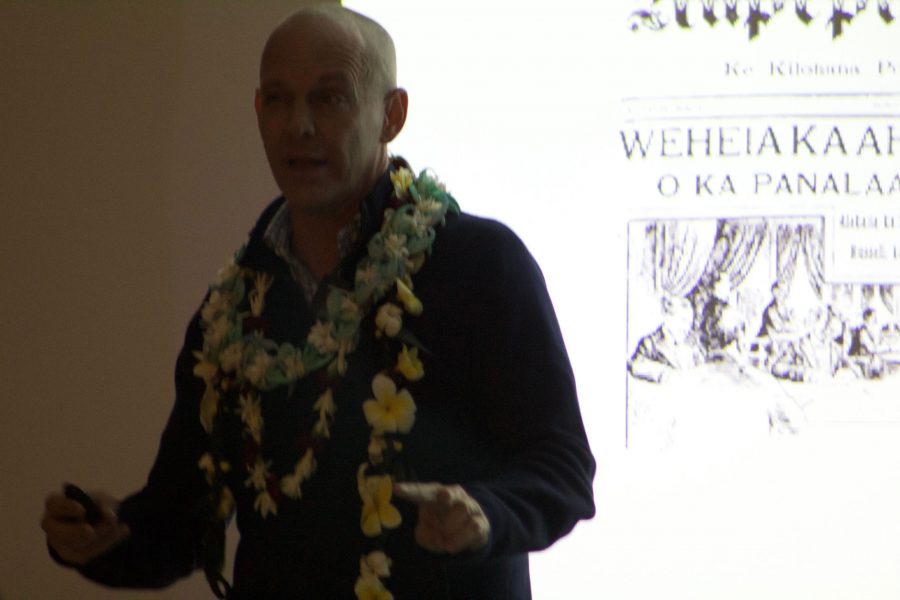
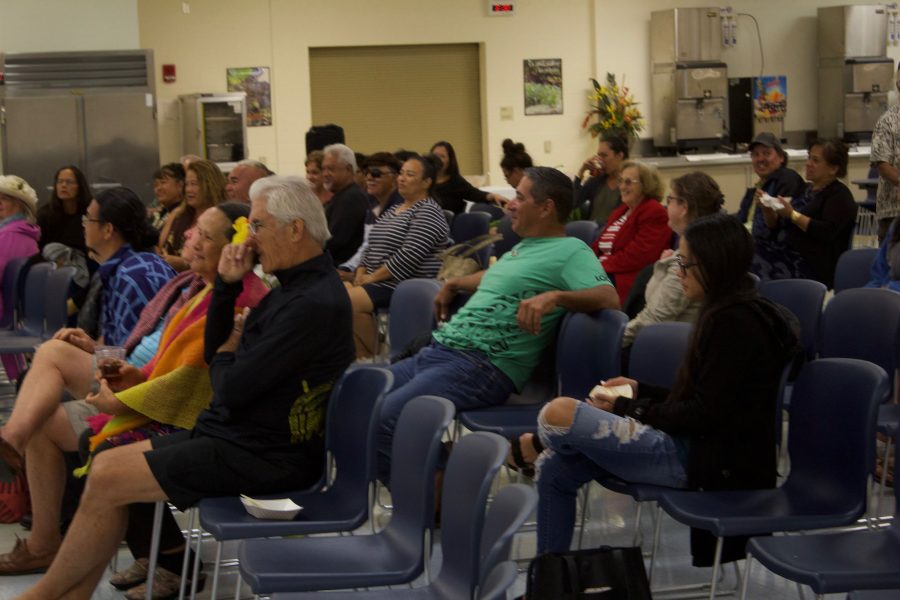


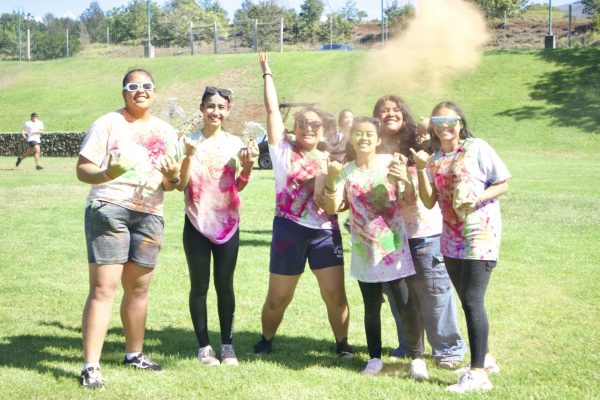
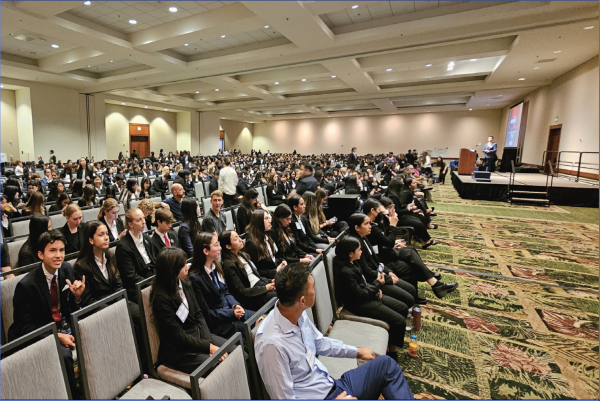
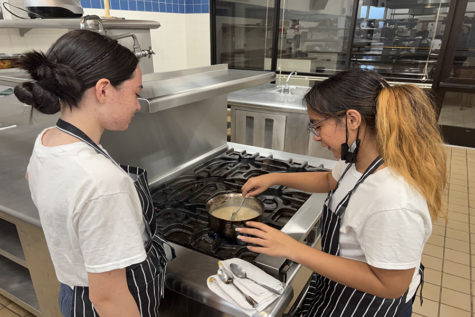



Maddy • Aug 19, 2018 at 6:58 am
Thank you for sharing this. During the recent Primaries I read so many comments by Hawaiians desperstely wanting change yet did not want to vote. There was one candidate who really would have fought for the betterment of the people yet he was not elected. He continued post Primary to care for the people. This I feel had explained so much to me. Thank you